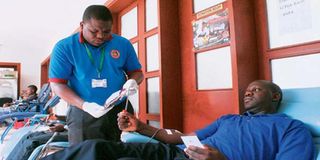Don’t pay for blood transfusion, public told

National Blood Transfusion Services staff Daudi Mkwawa examines blood donated by Japhace Daudi at the NBTS headquarters in Dar es Salaam yesterday. The centre cautioned the public not to pay for blood transfusion in hospitals. PHOTO | MICHAEL MATEMANGA
What you need to know:
Briefing journalists during a blood donation session by members of the Seventh Day Adventist Church in Dar es Salaam yesterday, Mr Mwenda added: “Since the donors give their blood for free, a patient who needs it should not be charged either.”
Dar es Salaam. The National Blood Transfusion Service has cautioned those taking patients to hospital not to pay for blood, which is given free of charge. All Tanzanians have a right to free blood in both public and private hospitals, Public Relations Officer Rajab Mwenda said.
Briefing journalists during a blood donation session by members of the Seventh Day Adventist Church in Dar es Salaam yesterday, Mr Mwenda added: “Since the donors give their blood for free, a patient who needs it should not be charged either.”
He urged other institutions and groups such as political parties to come forward and give blood since traditional donors such as students no longer turn out in huge numbers. The shortfall could be tied to the fact that a donor must be above 18 while many students complete secondary school before that age. This means the blood transfusion service must work harder to rope in new donors.
“We were going to the universities but the turnout is always low,” Mr Mwenda added. “That is why our focus is now on institutions.”
Tanzania needs about 40,000-45,000 pints of blood but only an average of 30 percent is readily available. About 140,000 (28 percent) pints were collected last year, leaving a deficit of about 300,000 pints. Much of the balance is given by relatives and friends as the need arises.




